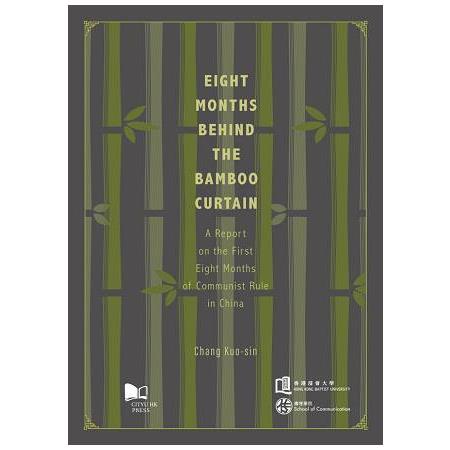Eight Months Behind the Bamboo Curtain—A Report on the First Eight
活動訊息
內容簡介
This was the motto of Chang Kuo-sin, and the ideal which he inspired generations of students of communication to follow. He proved his own dedication to this when, in 1949, he found himself in Nanking, the former nationalist capital, under the rule of the newly victorious communists. For eight months he lived and attempted to work in the midst of these historical changes. He managed to smuggle his detailed notes out to share with the world at a time when almost no reports of the new regime were being published. To mark the centenary of his birth, Hong Kong Baptist University’s School of Communication has republished this important work by one of its most distinguished professors.
目錄
PART ONE
Communists Rule in Nanking After One Month of Trial
(April 23 – May 23, 1949)
1. Communist Government
2. Popular Reactions
3. Communist Press
4. The Communist Army
5. Nationalist Retreat from Nanking
6. Communists and Foreign Recognition
PART TWO
Communist Rule in China After Eight Months of Trial
(April – December 1949)
1. Communist Totalitarianism
2. Communist Efforts to Disguise Totalitarianism
3. Democratic Spirit Within the Communist Party
4. The Threat of Diversionism Inside the Communist Party
5. Communist “Lean to One Side” Principle
6. The Merits and Demerits of the Communist Government
7. Disillusionment and Discontent in Communist China
8. Causes of Disillusionment and Discontent
9. Disillusionment and Discontent Among Workers
10. Disillusion and Discontent Among Farmers
11. Problems Facing the Communists – Currency
12. Problems Facing the Communists – Agriculture and the Industry
13. Problems Facing the Communists – Famine
14. Problems Facing the Communists – How to Sell Soviet Russia to the Chinese People
15. Soviet Help in the Sovietisation of China
16. Soviet Russians and Manchuria
17. Moslem Opposition to Communist Rule
18. Foreigners in Communist China
19. “Democratic Personages” in Peking
20. Will the Communists Turn Titoists in the Future?
21. Farewell to Communist China
序/導讀
Preface to the Second Edition
My basic motivation in republishing this little book from a manuscript written forty-nine years ago (which was published in Chinese the same year) is to preserve a memento of my old days with the United Press of America, an experience that I value tremendously in my life.
I was the United States Staff Correspondent in China from 1946 to 1952, based in Nanking, the nationalist capital of China. When the Chinese communists banned foreign news agencies in the fall of 1949, I was transferred to the United Press Bureau in Hong Kong.
The original manuscript for this book was made for publication in Chinese. I must have kept copies but have lost them in the long years since and had not expected to see any copies until this one was found among the wartime papers of US General Claire L. Chennault.
General Chennault achieved fame when he organised the American Volunteer Group (AVG), also known as the Flying Tigers, in 1941 to aid China in the war against Japan. It was later expanded into the US 14th Air Force, and General Chennault became its commander with the rank of Lieutenant General.
This little book has no contemporary interest, albeit perhaps some contemporary relevance since it is possible that what the Chinese communists encountered and experienced in the first eight months of their rule might have helped convert them into what they are today.
The Chinese communists can be said to have been tamed at birth, the cumulative result being: the Chinese communists were compelled to abandon the radicalism of their Marxist ideology and continue to accept the moderation of Chinese philosophy, though stubbornly keeping their brand name – communism. They answered in their own way the question of what is in a name: as long as they keep their name, they could and are willing to do anything else.
At the end of my eight months stay behind the Bamboo Curtain, I left China with mixed feelings – with regret that I would not be able to witness what could be described as one of China’s most cataclysmic transformations in history; and with happiness that moving to Hong Kong would assure my family and me a life without uncertainty and fear, where we could at least be sure of tomorrow.
In 1956, I met veteran journalist K.S. Chang in Singapore who gave me the first hint of what might have happened to me if I had stayed behind in China. His initials are the same as mine, leading the Chinese communists to mistake him for me. Mr. Chang was formerly editor-in-chief of the English-language China Times in Shanghai and moved to Singapore before the “liberation” to become the editor-in-chief of the Singapore Standard, often called the Tiger Standard. His wife, who was still in Shanghai when the city was “liberated”, was denied an exit visa to join her husband in Singapore. The Chinese communists thought she was my wife. After they realised their mistake, they granted her the exit visa. The Chinese communists continued their pursuit of me, harassing and questioning some of my friends about my whereabouts.
In China I had watched and covered its greatest intellectual and political revolution in history. I learned much about the forces of history which alienated the government from the people and inspired a revolution to establish democracy and freedom. I learned, too, that all good things do not always end in good results.
The Chinese communist revolution to overthrow autocracy and oppression ended, as we all know by now, in worse democracy and oppression. That was what appeared in the first eight months of communist rule in China. But it has changed over the years and has become more acceptable to the Chinese people.
In my 1950 manuscript, I reported copiously on the negative Chinese public reactions to comm
配送方式
-
台灣
- 國內宅配:本島、離島
-
到店取貨:
不限金額免運費



-
海外
- 國際快遞:全球
-
港澳店取:


訂購/退換貨須知
退換貨須知:
**提醒您,鑑賞期不等於試用期,退回商品須為全新狀態**
-
依據「消費者保護法」第19條及行政院消費者保護處公告之「通訊交易解除權合理例外情事適用準則」,以下商品購買後,除商品本身有瑕疵外,將不提供7天的猶豫期:
- 易於腐敗、保存期限較短或解約時即將逾期。(如:生鮮食品)
- 依消費者要求所為之客製化給付。(客製化商品)
- 報紙、期刊或雜誌。(含MOOK、外文雜誌)
- 經消費者拆封之影音商品或電腦軟體。
- 非以有形媒介提供之數位內容或一經提供即為完成之線上服務,經消費者事先同意始提供。(如:電子書、電子雜誌、下載版軟體、虛擬商品…等)
- 已拆封之個人衛生用品。(如:內衣褲、刮鬍刀、除毛刀…等)
- 若非上列種類商品,均享有到貨7天的猶豫期(含例假日)。
- 辦理退換貨時,商品(組合商品恕無法接受單獨退貨)必須是您收到商品時的原始狀態(包含商品本體、配件、贈品、保證書、所有附隨資料文件及原廠內外包裝…等),請勿直接使用原廠包裝寄送,或於原廠包裝上黏貼紙張或書寫文字。
- 退回商品若無法回復原狀,將請您負擔回復原狀所需費用,嚴重時將影響您的退貨權益。











商品評價